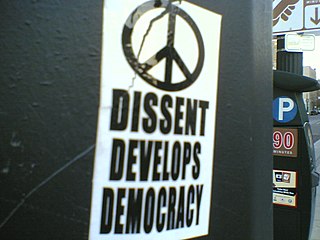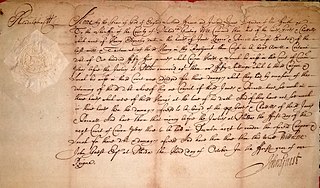Related Research Articles

An injunction is an equitable remedy in the form of a special court order that compels a party to do or refrain from specific acts. "When a court employs the extraordinary remedy of injunction, it directs the conduct of a party, and does so with the backing of its full coercive powers." A party that fails to comply with an injunction faces criminal or civil penalties, including possible monetary sanctions and even imprisonment. They can also be charged with contempt of court.

Dissent is an opinion, philosophy or sentiment of non-agreement or opposition to a prevailing idea or policy enforced under the authority of a government, political party or other entity or individual. A dissenting person may be referred to as a dissenter.
A lawsuit is a proceeding by one or more parties against one or more parties in a civil court of law. The archaic term "suit in law" is found in only a small number of laws still in effect today. The term "lawsuit" is used with respect to a civil action brought by a plaintiff who requests a legal remedy or equitable remedy from a court. The defendant is required to respond to the plaintiff's complaint or else risk default judgment. If the plaintiff is successful, judgment is entered in favor of the plaintiff, and the Court may impose the legal and/or equitable remedies available against the defendant (respondent). A variety of court orders may be issued in connection with or as part of the judgment to enforce a right, award damages or restitution, or impose a temporary or permanent injunction to prevent an act or compel an act. A declaratory judgment may be issued to prevent future legal disputes.

In common law, a writ is a formal written order issued by a body with administrative or judicial jurisdiction; in modern usage, this body is generally a court. Warrants, prerogative writs, subpoenas, and certiorari are common types of writs, but many forms exist and have existed.
In law, a judgment is a decision of a court regarding the rights and liabilities of parties in a legal action or proceeding. Judgments also generally provide the court's explanation of why it has chosen to make a particular court order.
Judgement is the evaluation of given circumstances to make a decision. Judgement is also the ability to make considered decisions. The term has at least five distinct uses.

Quid pro quo is a Latin phrase used in English to mean an exchange of goods or services, in which one transfer is contingent upon the other; "a favor for a favor". Phrases with similar meanings include: "give and take", "tit for tat", "you scratch my back, and I'll scratch yours", "this for that," and "one hand washes the other". Other languages use other phrases for the same purpose.

In law, a verdict is the formal finding of fact made by a jury on matters or questions submitted to the jury by a judge. In a bench trial, the judge's decision near the end of the trial is simply referred to as a finding. In England and Wales, a coroner's findings used to be called verdicts but are, since 2009, called conclusions.
In United States law, a motion is a procedural device to bring a limited, contested issue before a court for decision. It is a request to the judge to make a decision about the case. Motions may be made at any point in administrative, criminal or civil proceedings, although that right is regulated by court rules which vary from place to place. The party requesting the motion is the moving party or movant. The party opposing the motion is the nonmoving party or nonmovant.
In law, comity is "a principle or practice among political entities such as countries, states, or courts of different jurisdictions, whereby legislative, executive, and judicial acts are mutually recognized." It is an informal and non-mandatory courtesy to which a court of one jurisdiction affords to the court of another jurisdiction when determining questions where the law or interests of another country are involved. Comity is founded on the concept of sovereign equality among states and is expected to be reciprocal.

In contract law, a forum selection clause in a contract with a conflict of laws element allows the parties to agree that any disputes relating to that contract will be resolved in a specific forum. They usually operate in conjunction with a choice of law clause which determines the proper law of the relevant contract.
In law, the enforcement of foreign judgments is the recognition and enforcement in one jurisdiction of judgments rendered in another ("foreign") jurisdiction. Foreign judgments may be recognized based on bilateral or multilateral treaties or understandings, or unilaterally without an express international agreement.
In the United States courts, a motion for judgment as a matter of law (JMOL) is a motion made by a party, during trial, claiming the opposing party has insufficient evidence to reasonably support its case. It asserts that the evidence allows only one result: victory for the moving party, even if a jury has found otherwise. JMOL is also known as a directed verdict, which it has replaced in American federal courts.
Ewing v. California, 538 U.S. 11 (2003), is one of two cases upholding a sentence imposed under California's three strikes law against a challenge that it constituted cruel and unusual punishment in violation of the Eighth Amendment. As in its prior decision in Harmelin v. Michigan, the United States Supreme Court could not agree on the precise reasoning to uphold the sentence. But, with the decision in Ewing and the companion case Lockyer v. Andrade, the Court effectively foreclosed criminal defendants from arguing that their non-capital sentences were disproportional to the crime they had committed.

Pro Swing Inc v Elta Golf Inc 2006 SCC 52 is a leading Canadian case decided by the Supreme Court of Canada on conflict of laws. The Court held that foreign non-monetary judgments may be enforced in Canada where they have been rendered by a court of competent jurisdiction, the rendering is final, and the nature of the judgment is such that comity requires it to be enforced.
Pro se legal representation means to argue on one's own behalf in a legal proceeding, as a defendant or plaintiff in civil cases, or a defendant in criminal cases, rather than have representation from counsel or an attorney.

Psalm 1 is the first psalm of the Book of Psalms, beginning in the English King James Version: "Blessed is the man", and forming "an appropriate prologue" to the whole collection according to Alexander Kirkpatrick. The Book of Psalms is part of the third section of the Hebrew Bible, and a book of the Christian Old Testament. In Latin, this psalm is known as "Beatus vir" or "Beatus vir, qui non abiit".
This collection of lists of law topics collects the names of topics related to law. Everything related to law, even quite remotely, should be included on the alphabetical list, and on the appropriate topic lists. All links on topical lists should also appear in the main alphabetical listing. The process of creating lists is ongoing – these lists are neither complete nor up-to-date – if you see an article that should be listed but is not, please update the lists accordingly. You may also want to include Wikiproject Law talk page banners on the relevant pages.
Somerset v Stewart (1772) 98 ER 499 is a judgment of the English Court of King's Bench in 1772, relating to the right of an enslaved person on English soil not to be forcibly removed from the country and sent to Jamaica for sale. According to one reported version of the case, Lord Mansfield decided that:
The state of slavery is of such a nature that it is incapable of being introduced on any reasons, moral or political, but only by positive law, which preserves its force long after the reasons, occasions, and time itself from whence it was created, is erased from memory. It is so odious, that nothing can be suffered to support it, but positive law. Whatever inconveniences, therefore, may follow from the decision, I cannot say this case is allowed or approved by the law of England; and therefore the black must be discharged.

Luis Martínez is an American professional wrestler. He is currently signed to WWE, performing on the Raw brand under the ring name Damian Priest.
References
- ↑ Black, Henry Campbell (1910). A Law Dictionary Containing Definitions of the Terms and Phrases of American and English Jurisprudence, Ancient and Modern. West Publishing Company.
- ↑ The American and English Encyclopædia of Law: Must to Oath (1892), p. 717 (accessible on Google Books)